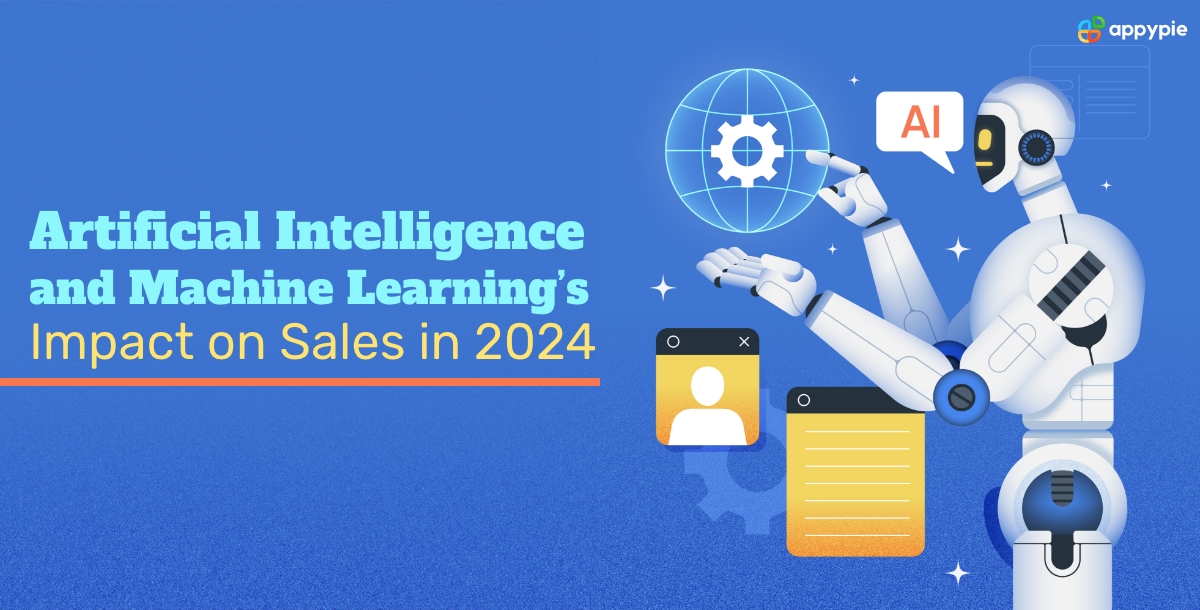Artificial Intelligence and Machine Learning’s Impact on Sales in 2024

The imitation of human intelligence processes by machines, particularly computer systems, is known as artificial intelligence. It includes all the tools and methods that allow computers to replicate human-like decision-making and problem-solving abilities. Machine learning is a branch of AI that focuses on statistical models and algorithms that let systems learn from data and get better over time.
What is the Role of Artificial Intelligence in Sales?
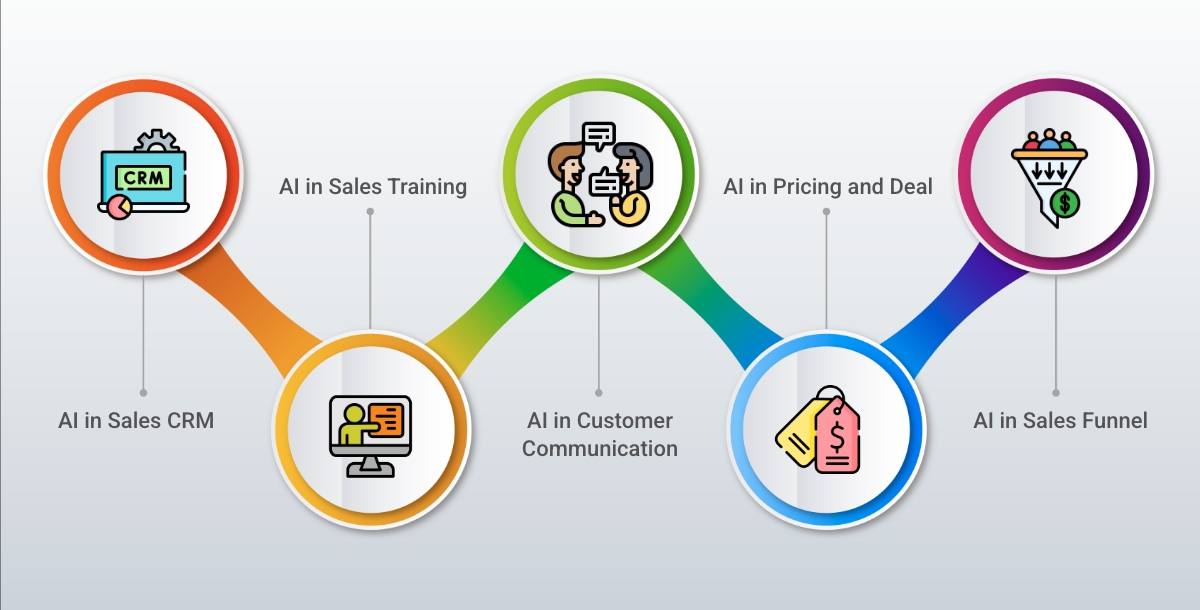
Combining artificial intelligence in sales can significantly improve lead generation, conversion rates, and customer experience and engagement.
- AI in Sales CRM
- AI in Sales Training
- AI in Customer Communication
- AI in Pricing and Deal
- AI in Sales Funnel
AI has optimized sales CRM for customer satisfaction and sales performance by improving its capabilities to provide personalized information and recommendations. Businesses can use advanced data analysis to better understand customer behaviors, preferences, and buying patterns. This helps sales teams to plan their sales strategies and communicate accordingly, resulting in more targeted and effective sales efforts. Additionally, AI-powered sales CRM systems can automate tasks such as lead scoring, forecasting, and pipeline management, allowing sales professionals to focus on building relationships and closing deals.
Sales training programs can be improvised by using AI to analyze individual sales representatives’ performance data and come up with their respective strengths, weaknesses, and learning preferences. With this information, AI can make customized sales training methods at the individual level. These methods may include product knowledge, communication skills, objection handling, and sales techniques. Moreover, AI can provide feedback and guidance instantly. This personalized approach can result in tangible improvements in performance and customer satisfaction levels.
AI can be used for automating communication, such as creating responses to customer inquiries or scheduling appointments, focusing specifically on crafting sales email examples. It can analyze past successful email campaigns, customer behaviors, and preferences to generate highly personalized and effective sales email templates. Additionally, AI can automate the scheduling and sending of a sales follow up email based on predefined triggers or customer interactions, ensuring timely and relevant communication with prospects and leads. This makes the sales workflow smooth, improves engagement, and increases the chances of conversions.
For finalizing the best-ranking prices and deals we can use AI systems for any product or service. It examines data on customer behavior, what your competitors charge, and current market trends. This lets you find the ideal price between what customers are willing to pay and what maximizes your profits. AI can also recommend upsells, discounts, and payment options for each customer, making them more likely to buy and increasing your overall sales success.
The sales funnel is like a real funnel, which has a wide opening at the top for potential customers, and as it narrows down, a large audience is filtered down to those who make the purchase. A properly structured funnel attracts new customers and nurtures existing ones, which leads to repeat business and builds customer loyalty. AI-powered sales funnels have changed the sales approach of businesses. Now, with just one click, businesses can get actionable insights, optimize marketing ROI, and provide better customer experiences. Best Artificial Intelligence Tools in Sales
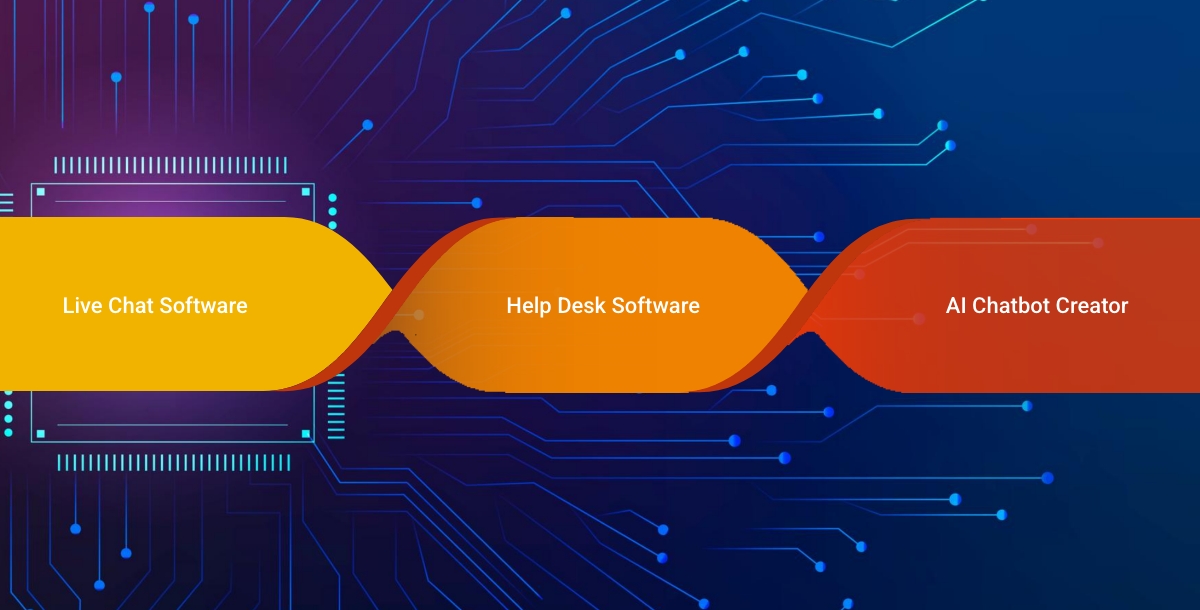
Here are some ways AI tools can revolutionize sales and marketing strategies.
- Live Chat Software
- Help Desk Software
- AI Chatbot Creator
AI-driven live chat software can assess customer behavior, identify patterns, and provide personalized recommendations based on the data collected during interactions. This helps sales representatives understand their prospects better and adjust their approach accordingly. AI algorithms can predict which leads are most likely to convert, enabling sales teams to prioritize their efforts effectively. Furthermore, AI can also assist in generating lead scores and identifying potential upsell or cross-sell opportunities.
Sales teams can use AI help desk software to simplify their customer interaction process. By integrating AI into help desk systems, sales reps can gain information about customer needs, preferences, and pain points. These findings can then be used to develop targeted marketing campaigns and improve product offerings. Moreover, AI can assist in managing customer inquiries, categorizing them based on priority, and assigning them to relevant sales team members. This ensures that no lead is missed and that all customer inquiries receive timely attention.
Chatbot builders enable businesses to create AI chatbots that can handle customer inquiries, qualify leads, and even close deals. AI chatbots can be integrated with live chat support software, contact center software, and ticketing systems, providing a smooth customer experience. AI chatbot can help businesses automate routine tasks, freeing up time for sales teams to focus on high-value activities.What is the Role of Machine Learning in Sales?
Machine learning is changing the sales industry by providing data-based information that improves operational efficiency and effectiveness. Let's explore five essential functions of machine learning in sales:- In sales, ML is used to analyze huge amounts of customer data to identify patterns and predict future sales trends.
- ML can help sales teams prioritize leads, personalize the sales experience, improve pricing strategies, automate repetitive tasks, and improve sales forecasting.
- ML algorithms can analyze customer interactions and past purchases to recommend products or services that are most relevant to each lead, leading to higher conversion rates and increased customer satisfaction.
- By analyzing market trends, competitor pricing, and customer behavior, ML can suggest the best pricing strategies that can help businesses maximize their profits while remaining competitive.
- ML can automate tasks such as lead scoring, data entry, and scheduling sales follow up emails, freeing up salespeople's time to focus on building relationships and closing deals.
Role of Artificial Intelligence in Marketing Vs Sales
| AI Role | Marketing | Sales |
|---|---|---|
| Customer Information | Analyzes customer data to understand preferences, demographics, and behavior. Identifies target audiences and segments. | Analyzes customer interactions and past purchases to predict future needs and personalize advertisement. |
| Content Creation & Personalization | Generates content ideas, and personalizes website content and recommendations based on user data. Makes content more search engine friendly. | Recommends products or services most relevant to leads based on their profile. Customize sales pitches and presentations. |
| Campaign Modification | Analyzes campaign performance data to identify what works and what doesn't. Modify ad spending and targeting for better reach. | Scores lead based on their likelihood to convert. Recommends best pricing strategies. |
| Automation | Automates repetitive tasks like email marketing, social media scheduling, and ad campaign management. | Automates tasks like data entry, lead scoring, and follow-up emails. Schedules meetings. |
| Predictive Modeling | Predicts customer behavior and future sales trends. Identifies potential churn risk and upsell opportunities. | Predicts the likelihood of a lead converting and helps prioritize sales efforts. Forecasts sales performance. |
Types of Artificial Intelligence for Sales Operations
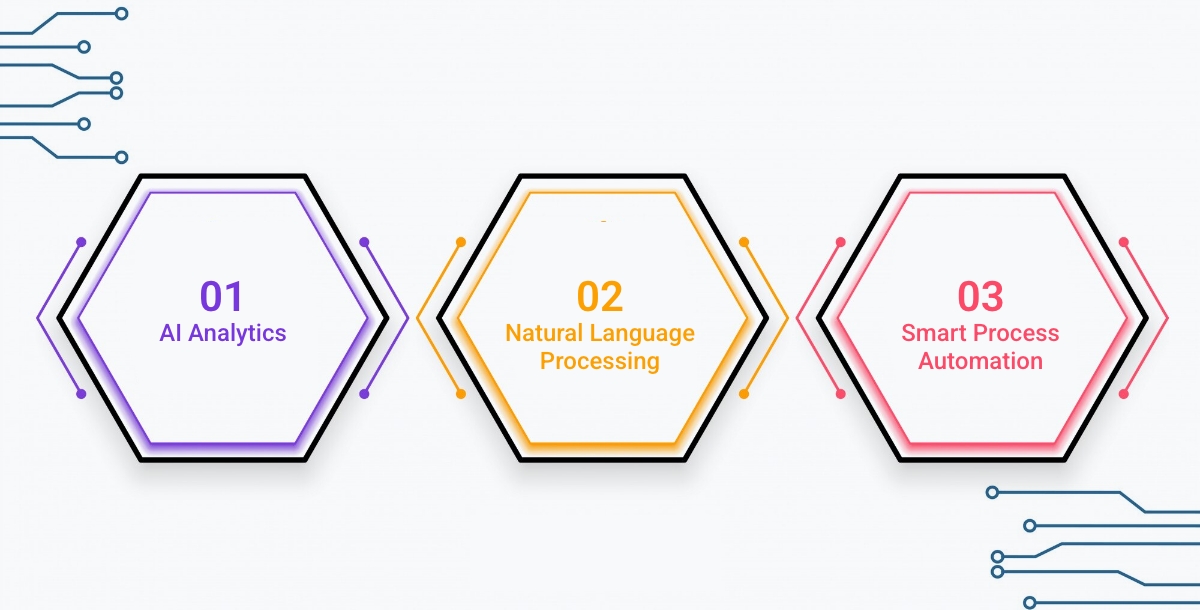
There are several different AI techniques used to upgrade sales operations, each with its own strengths:
- AI Analytics
- Natural Language Processing
- Smart Process Automation
AI Analytics is a powerful tool that uses machine learning to analyze vast amounts of sales data. This allows sales organizations to uncover patterns and trends that can be used for data-driven decision-making. By analyzing customer interactions and past purchases, AI Analytics can help sales teams personalize the sales experience and recommend products or services that are most relevant to each lead.
Machine learning can analyze speech and text by artificial intelligence, helping sales managers understand customer intent and sentiment and provide recommendations for actions.
Smart Process Automation is a technique that combines robotic process automation (RPA) with machine learning for even greater efficiency. SPA can automate repetitive tasks in sales operations, such as data entry or scheduling meetings, freeing up human reps for more strategic work. Predictive analytics is a technique that uses historical data and machine learning to forecast future sales performance. This gives sales teams the ability to predict trends, modify tactics, and allocate resources as efficiently as possible.3 Ways AI Can Empower Your Sales Team for Peak Performance
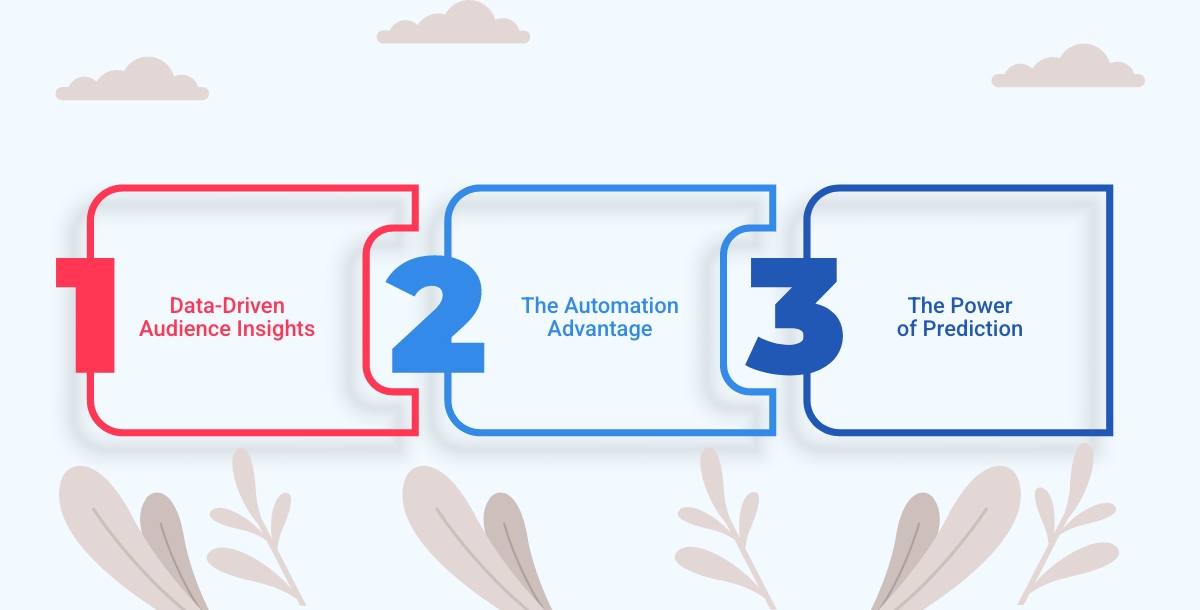
Imagine your sales reps having a trusty assistant: a tireless AI assistant that streamlines tasks, finds out customer information, and predicts future needs. This is the power of AI in sales, and it's revolutionizing the game. Here are 3 ways AI can boost your sales efficiency:
- Data-Driven Audience Insights
- The Automation Advantage
- The Power of Prediction
Sales reps are bombarded with information. AI steps in, analyzing vast amounts of customer data to identify patterns and trends. This translates to a deeper understanding of your customers, allowing reps to personalize their approach and target high-value leads with laser focus.
Say goodbye to repetitive tasks like data entry and scheduling follow-ups. AI automates these time-consuming activities, freeing up your reps to focus on what they do best: building relationships and closing deals. This empowers them to have more meaningful conversations with customers, eventually leading to higher conversion rates.
AI doesn't just gather numbers, it predicts the future (sort of). By evaluating historical sales data, AI can forecast future trends and identify potential obstacles. This allows your sales team to be proactive, customizing strategies and resource allocation to maximize success.Conclusion
Artificial intelligence and machine learning are converting the sales field by providing data-driven information that boost efficiency and effectiveness. AI analytics can find out patterns and trends in sales data, while machine learning algorithms can identify and examine customer interactions and past purchases to personalize the sales experience. AI sales CRM systems can automate tasks and provide personalized data, while AI chatbots can handle customer inquiries and qualify leads. Natural language processing and smart process automation can help sales operations by automating repetitive tasks and providing personalized recommendations. By making use of AI and machine learning, sales teams can improve lead generation, conversion rates, and customer experience, eventually making revenue growth and staying competitive in the market.
Related Articles
- How to Prepare for a Customer Service Interview- Questions & Answers
- Which are the Top 10 Apps to integrate with Zendesk in 2024?
- Top 10 Best Citing Websites For Simplified Research
- Creating the Ultimate Customer Service Team: A Guide to Hiring
- How to Convert Image to Text with Google Drive
- Top 10 Best Torrent Websites for Your Downloading Needs
- How to Create a Casino App? [With Features and Benefits]
- Typography Design 101: Guidelines and Terms
- Primary Colors: A Beginner’s Guide to Fundamental Colors
- How to Make Your Restaurant an Instagram Sensation?
